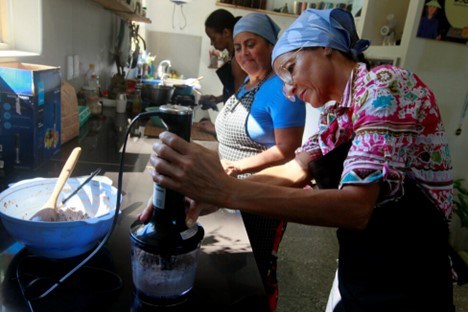
HAVANA TIMES – In Cuba, new ventures are emerging that produce healthy foods, generate income and employment, meet the needs of people with various health conditions, and promote new dietary habits and proper nutrition.
However, these private businesses face numerous challenges in a country with a deficient agricultural production, high prices, and dietary habits that undermine the health and quality of life of individuals.
Artisanal flours made from banana, cassava, rice, and coconut, gluten-free, distinguish Bacoreto, a family venture located in the municipality of Guanabacoa, one of the 15 districts that make up Havana.
“We meet a specific need such as the supply of gluten-free flours, substitutes for wheat flour. Our production reaches around 100 kilograms annually. They benefit about twenty people with celiac disease, diabetes, and hypertension,” explained Gabriel Perez, the director of the local project, aged 38.
A graphic designer and creative director by profession, Perez explained that Bacoretto was born in August 2022 on the grounds of his family’s farm of about 800 square meters and now employs eight people, five of them women. Except for the grinding, the remaining production processes are artisanal. The drying of fruits and tubers uses only solar energy or ambient temperature, he added.
“We started from a need, preserving food for a longer time. We thought about dehydrating farm produce for self-consumption until we reached the flours. We sent surplus to friends who are chefs, who encouraged us to continue producing due to their quality, texture, and flavor. That’s how the business idea was born,” Perez recalled.
In addition to cookies, “with the flours, we make baked products such as bread, waffles, and cakes, some of which we sell. We also make the most of the by-products of the harvests: we obtain coconut milk as well as vinegar from the peels.”
Although the production capacity is small, Perez stated that “we are useful to the community. Everyone can access our offerings, although those with celiac disease are the ones who demand the most because they struggle a lot to consume gluten-free.”
According to Perez, there is a lot of information, but “people are not always given the opportunity to learn about substitute foods and perhaps, with better nutritional contributions. Changing habits is complex.”

Context
Since October 2022, Cuba has had a Law on Food Sovereignty and Food and Nutritional Security, of strategic importance within the National Economic and Social Development Plan until 2030. The island’s government has defined food production as a matter of national security. The country imports about 80% of the food it consumes, which has become unsustainable due to economic liquidity problems.
The development of food production is overshadowed by a battered agri


